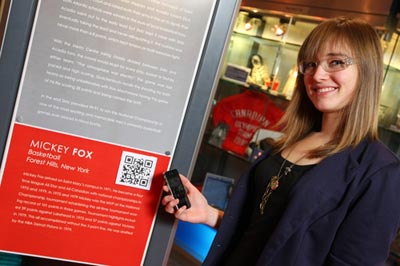 |
| Alexandra Montgomery is a Dal history grad who is thrilled to have a job in her field. (Nick Pearce Photo) |
Captain Gideon White was a prominent Loyalist who settled in Shelburne in 1784. At the time, Loyalists on the run from the American Revolution had swelled Shelburne's population to 10,000, bigger than¬ÝHalifax, Montreal¬Ýand Quebec.
As Alexandra Montgomery puts it, Gideon White is ‚Äúone of the big names of Loyalist Shelburne.‚Äù True, but before he became a name in the history books, he was a little boy from a well-to-do British family, a fact that came home to the ¬È∂π¥´√Ω history major as she held his coral-tipped, ornate silver soother in her hand.
‚ÄúThat‚Äôs what I love about museums‚Äîyou see the stuff of history,‚Äù says Ms. Montgomery,¬Ý 24, who graduated in the spring. ‚ÄúYou see the things they held, the tools they used, the places they lived. It brings it alive for me. It feels more relevant somehow.‚Äù
Finding her calling
While at ¬È∂π¥´√Ω, Ms. Montgomery says she floundered for a few years, starting in women‚Äôs studies and then transferring to English. But nothing felt quite right and she considered dropping out. Then, she got a summer job at the Cole Harbour Rural Heritage Farm, and, as they say, the rest is history.
“History never dawned on me as a career opportunity before,” she relates. “But here I was, hanging out in a dark room and dealing with the physical stuff of history. I was having a ball. I switched (to history) and it’s been smooth sailing ever since.”
In the last year of her arts degree, she won three major history prizes including the Department of History’s Commonwealth & British essay prize and one of 10 prizes in the annual Canadian undergraduate essay competition held by the North American Conference on British Studies for a paper originally submitted for one of her fourth-year classes. The third prize, the David Alexander Prize awarded by the University of New Brunswick for the best essay in Atlantic Canadian history, was for an essay she presented to a conference in June, timed to mark the 250th anniversary of the Planter migrations to Nova Scotia.
Since graduation, she’s been on an internship with the Association of Nova Scotia Museums working on a pilot project investigating the use of QR codes on artifacts or displays. QR codes, or quick-response codes, are barcodes that can be scanned with a smartphone to link to websites where more information can be gleaned. That information might include recorded oral histories, photos, information about related artifacts—”all the deeper stories that don’t fit on labels,” says Ms. Montgomery. For small community museums, the QR codes will help to enrich the museum-going experience without a huge expense, integrating history with the Internet and mobile technologies.
'Creation of Canada'
So, the QR code on Gideon White’s portrait at the Shelburne County Museum could link to a photograph of the soother, a picture of his descendants gathered for a family reunion and perhaps a broad outline of Loyalist migrations in the Shelburne area. To give another example, the QR code on Major General James Wolfe’s red cloak, held at the Army Museum with the Halifax Citadel, could connect to histories of Fortress Louisbourg and the Plains of Abraham or the famous 1770 painting by Benjamin West at the National Gallery of Canada which shows the British general dying on the battlefield, dressed in that same cloak.
“That cloak has witnessed the creation of Canada,” says Ms. Montgomery. “I find that extremely cool.”
She’s loving her job, which allows her to travel to small, mostly volunteer-run museums throughout the province, the Nova Scotia Sports Hall of Fame one day, the Anna Swan Museum in Tatamagouche the next. But with a few more months in her internship, she’s musing about graduate school.
“It makes sense in retrospect, me being here, but it took me awhile to figure it out ... I’m a big advocate that you need to know why you’re doing something. And if you want something bad enough you can make it work for yourself.”
